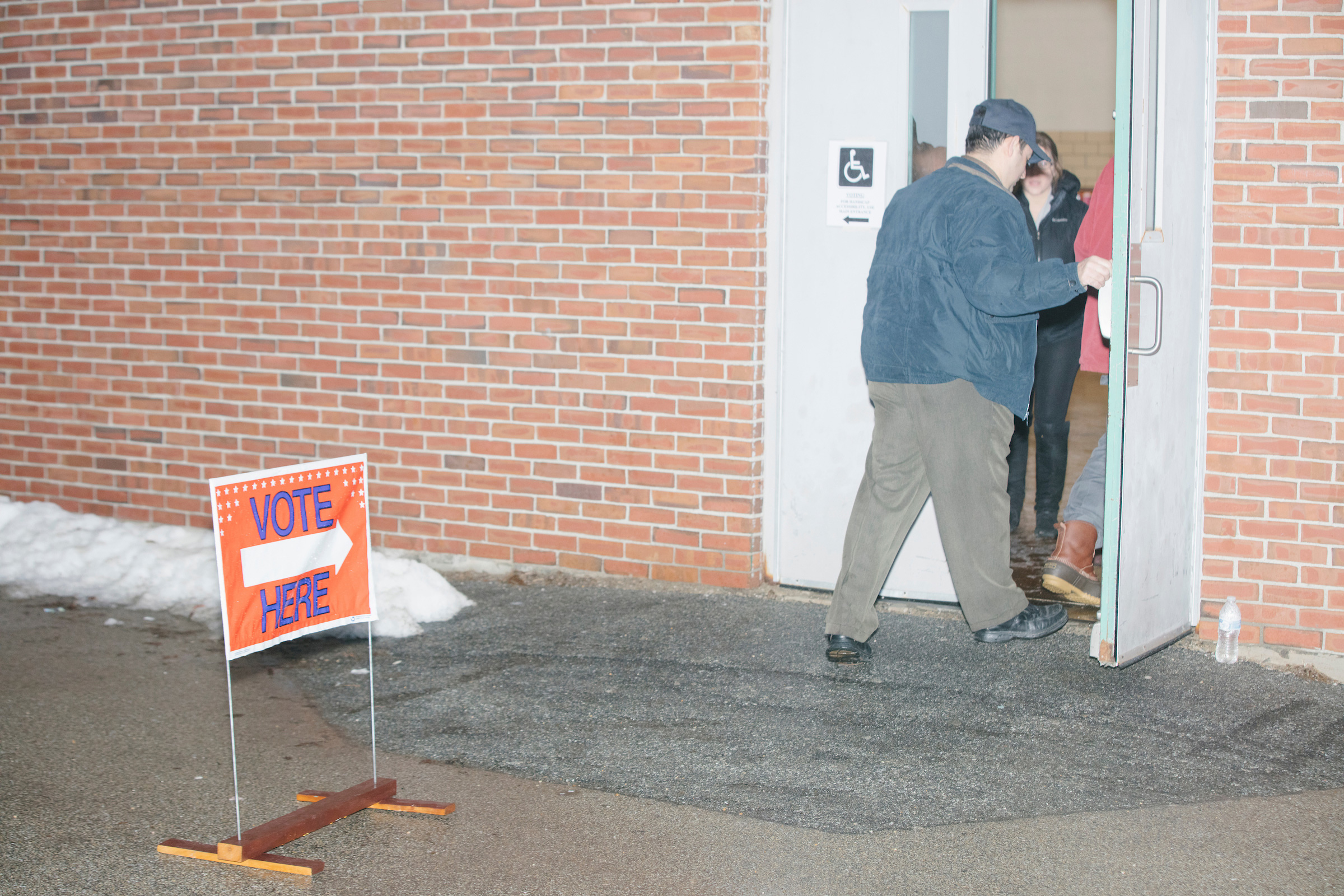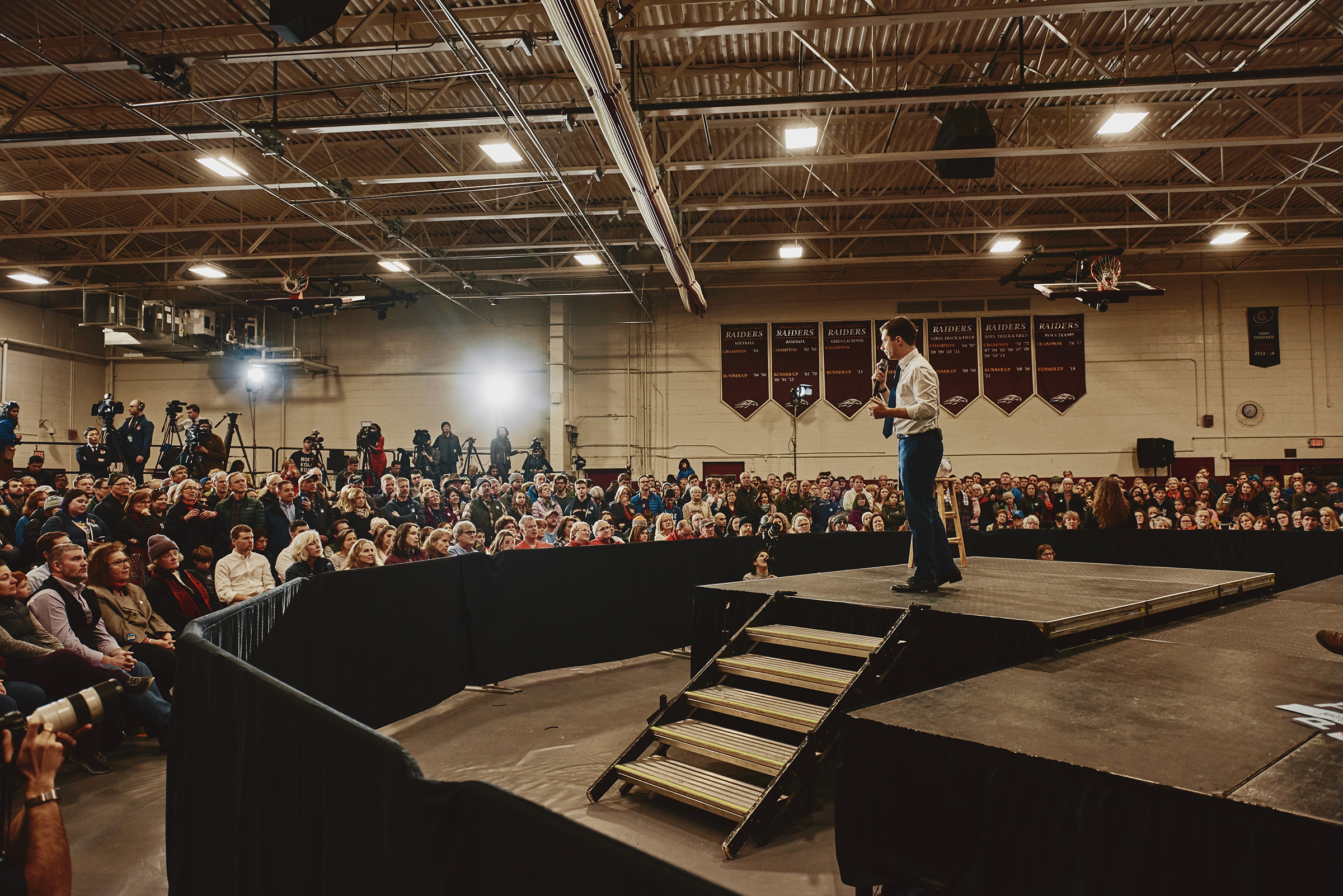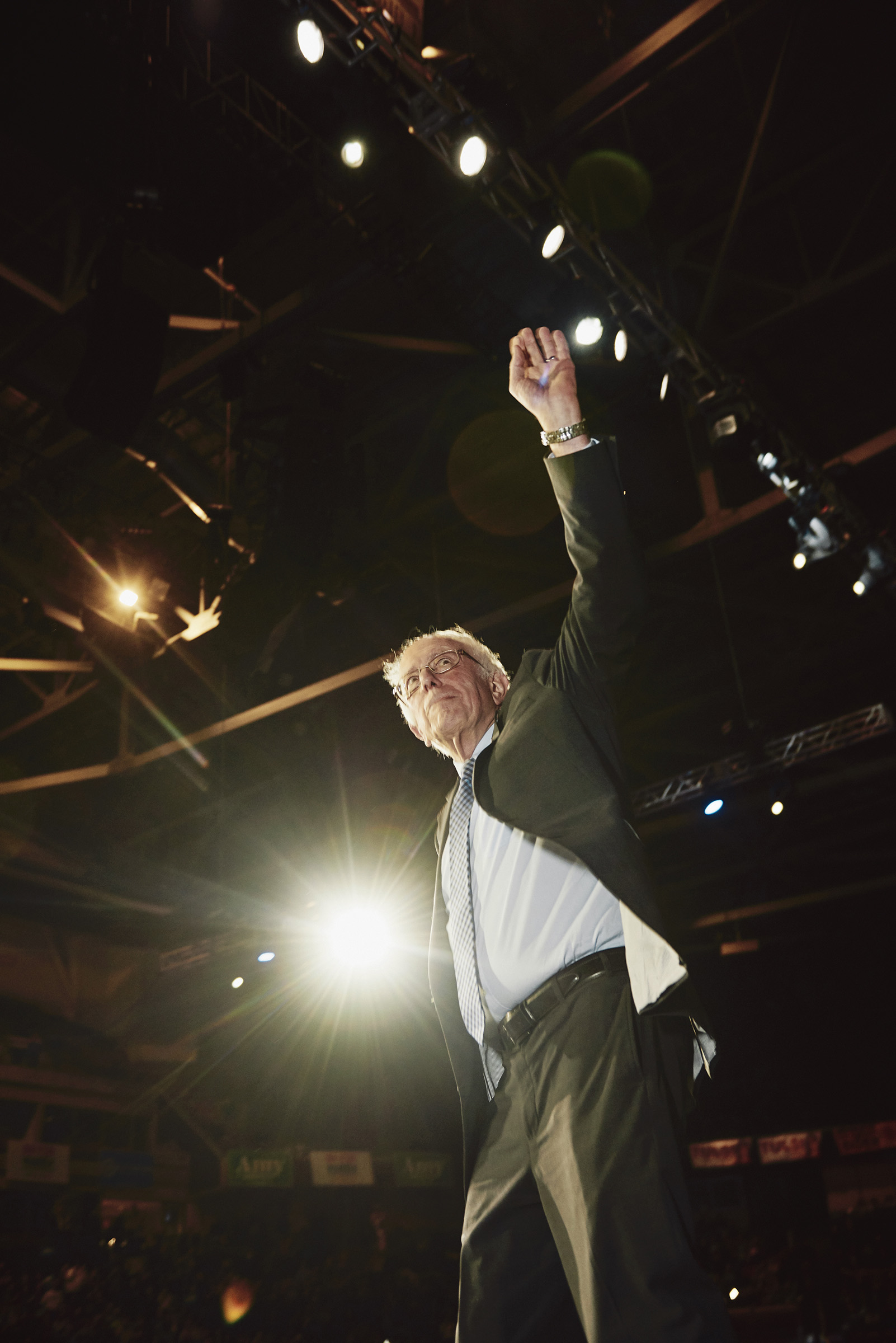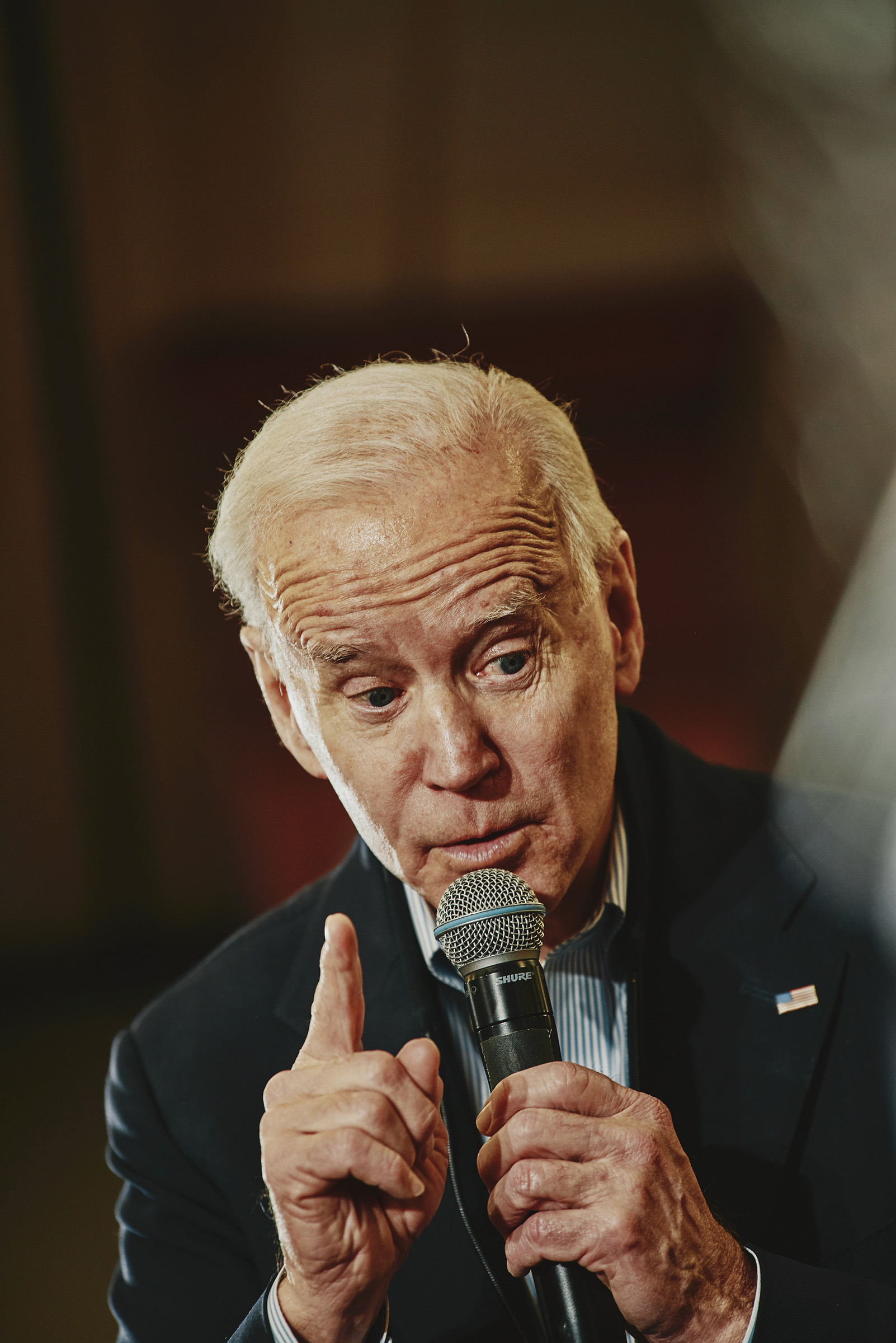
This is the room that scares the crap out of the Democratic establishment: a college gymnasium in Keene, N.H., packed to the rafters with nearly 2,000 Bernie Sanders fans joyfully noodle-dancing to a Vermont-based jam band playing a raucous cover of the Talking Heads song “Burning Down the House.”
A little while later, Sanders takes the stage, accompanied by his wife, three children and two grandchildren. “Thank you, Twiddle!” he says. Then he stops to reflect on how far he’s come since his ragtag campaign surprised everyone in 2016. When he presented his agenda four years ago, he says, “the corporate establishment said, Too radical!” Boo! the crowd yells.
“And the political establishment said, Too radical!” Boo!
“And the media establishment said, Too radical!” Boo! “But you know what the people of New Hampshire said?” And the crowd erupts into cheers and applause.
For all anyone knows at this point in the primary season, this man is the front-runner for the Democratic nomination, as likely as any candidate to be the party’s representative against President Donald Trump in November. Sanders got the most votes in last week’s bungled Iowa caucuses and leads the polls for Tuesday’s New Hampshire primary. While the other candidates strain to persuade waffling voters to take a chance on them, Sanders commands the deep loyalty of his adoring base of young people and the far left. As his rivals squabble about experience and electability, Sanders is cruising by unscathed.
If Sanders wins here, will he be unstoppable? And if so, then what? The party mandarins are sure he’s a disaster in the making, a recipe for re-electing Trump—that American voters will never go for a 78-year-old democratic socialist with an expensive, disruptive agenda. That, in the words of the celebrity consultant James Carville, who’s been stumping in New Hampshire for the long-shot moderate Michael Bennet, “we don’t have time for left-wing fantasies in this country.”
It’s up to the Democratic Party to rescue America from Trump, but instead, Carville says, it’s “out in some goofy la-la land.” Party insiders remember what the Republicans went through four years ago, when the establishment candidates’ circular firing squad allowed their own implausible party crasher to run away with the primary.

One solution to this stressful situation is just to relax and give in to the Bern, and that’s what Ellen Mendelson did. “I was a Biden person in the beginning,” the 56-year-old social worker says, zipping up her coat after Sanders’s speech ended. The former vice president seemed “tried and true,” and she was skeptical that Sanders would appeal to voters outside New England. She went to see Pete Buttigieg and Amy Klobuchar speak, too. But none of them moved her to tears the way Sanders does.
“I don’t know if it’s realistic, if he can really do all those things he’s talking about,” Mendelson says. “Part of me is doubtful, honestly. But I do believe if there are enough of us following him, change can happen. It feels like the right thing to do at this moment. We need big change.”
It’s a weird moment for a party that for three years has poured its energy into fighting Trump at every turn. Suddenly, the Democrats seem gripped by a low-grade panic, confronting the reality of a difficult primary with no consensus to be had. Somehow, up against a president they regard as a joke, a failure and a threat to the republic, they’re all flogging unity while running in different directions. A field that began with an embarrassment of riches—a record-setting 25 major candidates, including many truly big-time resumes—is now down to this odd lot of flawed hopefuls. Partisans find themselves seized by the paralyzing fear of making the wrong choice—or the sense that the right one doesn’t exist.
In a normal political year, the first contests in Iowa and New Hampshire are supposed to winnow the field and define its themes. But all Iowa established was the field’s abject confusion—and the potential for a long and contentious slog to an indeterminate endpoint. With Sanders coasting, the other candidates have developed ever more baroque rationalizations: Biden insists the first four contests are really a single group, Warren advisers are touting a delegate strategy that looks all the way to the convention, the previously little-known Amy Klobuchar seems to be experiencing a boomlet, and the billionaire New Yorker Mike Bloomberg appears to be getting national traction with his unprecedented TV blitz.

And so the candidates sprint across New Hampshire, making a single, frantic plea: can’t we all just get along? Even Sanders, whose fans consider him too pure for the vulgarities of politics, has his finger in the wind these days, recasting the theme of his rallies (“Bernie Beats Trump”) and arguing that he’s the electable candidate. “At this unprecedented moment in American history,” he says, “let us win here in New Hampshire, let us win the Democratic nomination, let us defeat Donald Trump and transform this country!”
An hour north and a day prior, the line to see Pete Buttigieg stretches out the door and around the parking lot of a high school in Lebanon, N.H. The 38-year-old former South Bend, Ind., mayor was treading water in the polls here until his strong showing in Iowa. Now, as freaked-out moderates cast about for an alternative to rally around, he’s getting crowds nearly as big as Sanders.
Buttigieg is introduced by the local congresswoman, Annie Kuster. “I am so fired up from spending the day with Poot—Pete Beet—Pete Buttigieg!” she says. Explaining how she decided to support him, Kuster lists some of his policy positions, to silence from the crowd. But what she was really drawn to, she says, is his temperament: “Whether he agrees with you or disagrees with you, he’s going to be calm, he’s going to be respectful, he’s going to be thoughtful,” she says. For this, there are loud (but polite!) cheers.
Buttigieg is so poised and polished and squeaky-clean that some find him creepy. He inspires passionate hatred in the online left; the Sanderista podcast Chapo Trap House recently described him as a “rat-faced CIA operative” who “probably kills dogs for fun.” (There is no evidence Buttigieg has ever been in the CIA or killed a dog for any reason.) But to the people gathered here, this squareness is a balm. “I hear people say, if the only choice is between a revolution or the status quo, that doesn’t leave much room for them,” he says, and hundreds of heads nod in relieved recognition.
This is Buttigieg’s first appearance since the release of an attack video by the Biden campaign, which ridiculed his experience with brutal sarcasm. While Biden was helping pass the Affordable Care Act and negotiate the Iran nuclear deal, it taunted, Buttigieg was navigating his city through such challenges as microchips for pets and decorative lights on bridges. A few minutes into his speech, Buttigieg uncorks his response: “Some people say, what business does the mayor of South Bend, Indiana, have running for president,” he says. “You don’t have a big office in Washington, D.C. You haven’t had decades of experience in the Capitol. You come from a community in the industrial Midwest that isn’t even one of the biggest cities in America. To which I say: that is very much the point.”
It’s a clever answer that epitomizes his deftness—and also, to some, his smarm: the confidence to turn a desperate attack back on his opponent, but also the fetishization of life in the heartland that rivals find infuriatingly smug. After his speech, Buttigieg gets questions about NASA, disability policy and Venezuela—part of which he answers in halting Spanish.
“I am very, very worried,” says Marianne Burke, a 62-year-old special-ed teacher. “I’m terrified. We’ve got to get it together as Democrats.” But she can’t make up her mind either: Buttigieg is inspiring but inexperienced; Klobuchar’s debate closing was powerful, but does she have a chance? She worries that the strong economy is giving Trump a boost and doesn’t understand why no one seems bothered by his outrageous behavior.
“I just want to be inspired,” she says. “I’m so tired of Trump and everything he represents. We need somebody who’s going to bring out the best in all of us.”
Perhaps Buttigieg, who’s elevated inoffensiveness to an ideology, is the right vessel for this yearning for unity. But these days Democrats don’t feel like they can trust their own instincts. There’s a pervasive longing for a deus ex machina—something to free them from the pain of making this decision, with its awful weight. Won’t someone just figure it out for them?
Kathy Parsonnet, a 65-year-old artist, has found her thoughts drifting to former New York Mayor Mike Bloomberg, even though he’s not on the ballot here. “I never would have thought I would find him appealing,” she muses. “I don’t love billionaires—I’m more of a socialist myself. But there are a lot of people in this country who look at money as a sign of success. And he is different from all the other candidates.”
Later that night, all the candidates appear at a party dinner in Manchester, and Buttigieg tries the small-town pride line again. The section of Sanders fans in the stands boos him, and starts up a chant: “Wall Street Pete!”

At a community college in Manchester, Elizabeth Warren is among friends—her constituents. The crowd of volunteers who’ve shown up to do get-out-the-vote canvassing is largely made up of Massachusetts residents who’ve made the short drive up from the Boston area, hoping to convince their New Hampshire neighbors that their beloved senator still has a chance.
Once an industrial bastion, New Hampshire has increasingly become a Boston exurb, a collection of bedroom communities of affluent college-educated professionals. That demographic could be Warren’s sweet spot, but she’s had a hard time breaking out of it. And her third-place finish in Iowa put her in a difficult position: the voters looking for an electable moderate have ruled her out as too far left, while those looking for a progressive have overwhelmingly chosen Sanders instead. (Most of the attendees I speak to at Sanders’s events tell me they considered Warren at some point, but decided Sanders was stronger.)
Now, Warren is frantically trying to respond by narrating the viral moment that made her a superstar of the anti-Trump resistance back in 2017. “Three years ago yesterday, Mitch McConnell tried to throw me off the floor of the United States Senate for reading a letter,” she says—a letter from Coretta Scott King opposing Jeff Sessions, Trump’s first attorney general. “And he said those words that have been printed on T-shirts, embroidered on pillows and tattooed on people’s bodies: nevertheless, she persisted.” There are cheers, whistles and a shout of “Attagirl!” from the crowd.
The message is obvious: Warren plans to persist in this fight just as she persisted in reading that letter. “I’ve been winning unwinnable fights all my life,” she says. By the end, the crowd is chanting, “War-ren! War-ren!” as she does a little dance onstage.
Standing in the back with her 18-month-old son in a stroller, Danielle Piemonte wishes more people could see what she sees when she looks at Warren. She worries that Warren is getting pushed out of the frame by all the hype around Sanders and Buttigieg. She herself once considered Buttigieg—she liked what she heard from him on Pod Save America—but came to find him inauthentic, she says.
Piemonte says she was forced to leave her job at a Boston-area nonprofit due to the high cost of childcare, an issue Warren has emphasized. She likes Sanders, too, but finds him “kind of abrasive.”
“I don’t want another old white man,” she adds. “I’m ready for a competent, capable woman.”

It’s a good day for Joe Biden, relatively speaking. In Hampton, N.H., a healthy crowd of 200 or so people has come to see him speak in a wood-paneled hotel conference room. Biden starts on time and seems energetic. He cracks some jokes and plants a kiss on a woman he recognizes in the front row.
But within a couple of minutes, Biden’s mind has drifted back to 1972, and he’s off reminiscing. What follows is 15 solid minutes of death and misery: story after story about people losing loved ones, losing jobs, getting terminal cancer. Biden’s own lengthy experience of loss mingles with anecdotes from other people he’s met in an unending stream, culminating in a story about hungry kids at a food bank.
After spending nearly a year as the national frontrunner, Biden has suddenly tumbled, his fourth-place finish in Iowa taking the wind out of his sails. His campaign has gone through a shakeup and he’s retooled his presentation, trying to seem forceful by suddenly and randomly shouting.
For a candidate whose political situation isn’t particularly hopeful, the whole thing is a giant bummer. He’s framed his run as an act of duty—called out of retirement by a compulsion to save the country from Trump—but as his political stock plummets and other candidates in his mainstream lane struggle for oxygen, it’s started to seem almost like sabotage instead.
A young woman raises her hand in the question-and-answer portion. “I’m going to be a little bit mean,” she says. “So, you’re arguably the candidate with the greatest advantage in this race. You’ve been the vice president, you weren’t burdened down by the impeachment trial”—that is, not stuck in Washington like the sitting senators, she means. “How do you explain the performance in Iowa, and why should the voters believe that you can win the national election?”
“It’s a good question,” Biden says. “Number one, Iowa’s a Democratic caucus. You ever been to a caucus? No, you haven’t. You’re a lying, dog-faced pony soldier.”
Biden goes on to explain that he sees the first four states as a single bloc, that his “overwhelming” support in the black community has yet to manifest itself, and that he’s at a disadvantage in New Hampshire against the two New England candidates. But it’s his bizarre turn of phrase, though clearly meant teasingly, that gets picked up from this exchange, batted around Twitter by incredulous haters marveling at the off-key folksiness of a man whose slang has gone out of style.
Biden’s supporters try to look on the bright side. “He does get tired and ramble a bit,” says John Stevens, 73, the CEO of a tech company from just up the road in Statham. “But talking for that long in front of this many people, I’d probably do the same thing.”
His wife Renata Stevens, a retired teacher, says she’s trying to stay hopeful, but the campaign has her worried. Can any Democrat beat Trump? “To be honest, I think the chances are slim,” she says. “Trump has such a strong base, no matter what he says, people support him. It’s very depressing.”
The Stevenses were once friends with their Republican neighbors but find it hard to look at them anymore. “They’re racist. We just never saw it before,” John Stevens says. “It’s like you’re walking around with all these people and suddenly they turn out to be aliens.” The Stevenses say they’ll do anything to defeat Trump; they just wish they knew what to do.
Terry Shumaker waves away the bad polls and the smug pundits writing off Biden so soon. A Concord-based lawyer and former ambassador to Trinidad, Shumaker supported Biden in his first presidential run, in 1988, and has the vintage buttons to prove it. He also co-chaired Bill Clinton’s campaign here in ‘92, when an unexpected surge in New Hampshire revivified the campaign of the “Comeback Kid.”
Shumaker understands why so many of his fellow Democrats are worried, but he thinks it’ll all work out. “The stakes are so huge this time—that’s what’s driving the indecision,” he says. “I was for Hillary last time, and unfortunately the party didn’t fully come together” after the primary. “But that was because people didn’t recognize the danger of Donald Trump. They do now. This time, people are well aware that he could win.”
More Must-Reads from TIME
- Donald Trump Is TIME's 2024 Person of the Year
- Why We Chose Trump as Person of the Year
- Is Intermittent Fasting Good or Bad for You?
- The 100 Must-Read Books of 2024
- The 20 Best Christmas TV Episodes
- Column: If Optimism Feels Ridiculous Now, Try Hope
- The Future of Climate Action Is Trade Policy
- Merle Bombardieri Is Helping People Make the Baby Decision
Write to Molly Ball at molly.ball@time.com
